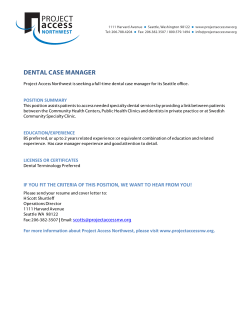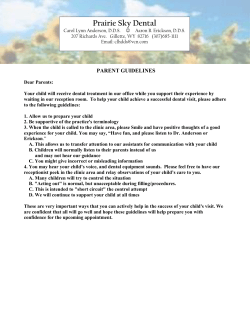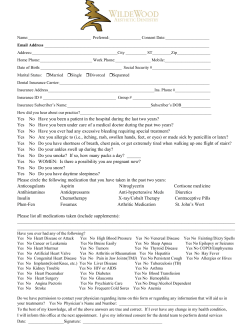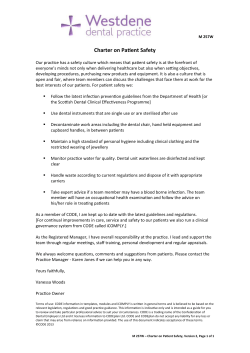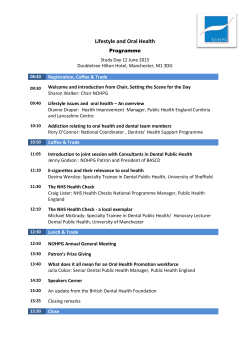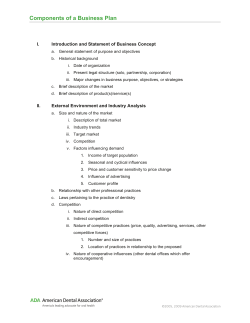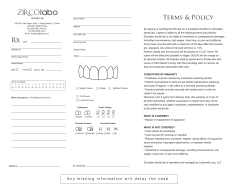
Click here for full version PDF
Getting down to business THERE ARE MORE DENTISTS QUALIFYING THAN IN THE PAST AND SO COMPETITION FOR JOBS IS FIERCE. YOUNG DENTISTS HAVE REALISED THAT THERE IS A NEED TO DIFFERENTIATE THEMSELVES with... Reena Wadia A RISING STAR OF THE DENTAL WORLD AS AN ASSOCIATE DENTIST, REGISTRAR IN PERIODONTICS,TUTOR TO FINAL YEAR DENTAL HYGIENE AND THERAPY STUDENTS FROM BARTS AND LONDON, EDITORIAL BOARD MEMBER FOR DENTAL JOURNALS SUCH AS ‘DENTISTRY’ AND ENTHUSIASTIC DENTAL BLOGGER. BOD : Hi Reena…Can you tell us a little bit about what you do? RW : I am currently undertaking speciality training in periodontology at Guy’s Hospital. I am completing this part time so I usually spend three days a week at the hospital. I’m almost half-way through and the experience so far has been stimulating thanks to the very dedicated teaching team at Guy’s. Although enjoyable, the course is certainly demanding. However, the close support given by fellow periodontal trainees definitely helps when it comes to meeting the stringent requirements and passing the rigorous assessments. I am also working part time in practice at Harley Street Dental Studio and Woodford Dental Care, providing general dental care with a special interest in periodontics. In both practices, I am guided by fantastic principals who are dedicated to the profession. Their professional achievements inspire me and I am grateful for the time and effort they give me. One day a week, I also have the privilege of teaching the final year dental therapy students at Barts and The London. Finally, as well as my daytime jobs, I’m a keen dental blogger by night! I find social media fascinating and it allows me to indulge my three greatest passions – learning, sharing and connecting. BOD : What’s the long-term vision for you? RW : Well, the Adult Dental Health Survey 20091 revealed that the amount of severe periodontitis has increased by nearly 50% over the past 10 years – so I will clearly be spending a lot of valuable time with my curette! I hope to continue to develop my knowledge and skills in the field of periodontics sufficiently enough to achieve a recognised position. I would also like to keep in tune with the challenges faced by GDPs and help them to achieve better periodontal results for their patients as well as contribute to the wider profession, particularly by helping young dentists tackle the unique challenges faced at the start of their career. BOD : What are the key principles that drive you? RW : 1. Inspiration – I look up to people ahead of me that have made a mark in their career, and seeing how accomplished they are inspires me to strive for similar achievements. 34 the business of dentistry 2. Both giving and receiving – I’ve noticed that individuals of the highest calibre not only work hard to accomplish great things, but they are also passionate about helping others reach their goals. I’ve always found the latter particularly encouraging and believe it is worthy of emulation. 3. I love a challenge – even in the most difficult times, I think it’s important to remain focused and motivated. One of my favourite quotes related to this is by Dale Carnegie: ‘Most of the important things in the world have been accomplished by people who have kept trying when there seemed to be no hope at all’. BOD : What’s the best bit of business advice you’ve ever been given? RW : ‘Everyone backs a winner’ is the best piece of business advice I’ve received from a mentor. Quite simply, the fastest route to success is to ask someone who knows. But successful people are busy, resulting in a catch 22. However, if you work hard to successfully implement any advice they give you, they will always give you more. If you work harder to demonstrate progress, they will help you a lot as they believe you have the determination to succeed. After which, assistance arrives in many forms. In contrast, I have rarely found these same inspiring individuals give up their valuable time to unlock this process to help someone who just asked for help as they are struggling. So ‘everyone backs a winner’ has stayed at the forefront of my mind. BOD : What opportunities and threats do you think you and your industry faces? RW : There are more dentists qualifying than in the past and so competition for jobs is fierce. Young dentists have realised that there is a need to differentiate themselves, but the general consensus is that there is very little guidance on career development pathways. As a result, young dentists are being forced to manage their careers in a way that has not previously been required. As well as the uncertainty in the job market, newly qualified dentists have less clinical experience than their predecessors and are working in a more litigious environment with reduced NHS funding. All of these threats mean that young dentists are clearly qualifying at a very challenging time. However, even though this the business of dentistry 35 ACTION PLANS SMALL VICTORIES. GAME PLANS BIG WINS. Apexhub arena is a membership site for dental marketers. Members access all our online dental marketing strategies and tactics, including checklists, cheat sheets, reports, procedures, design assets and template landing page designs. To find out more visit: WWW.APEXHUB.COM/MEMBERS Getting down to business with... Reena Wadia HAVING THE OPPORTUNITY TO WORK WITHIN A MULTI-DISCIPLINARY TEAM HAS BEEN THE MOST ENGAGING AND REWARDING PART OF PRACTICE SO FAR is a tough period for junior dentists, I believe that there are ways of successfully navigating through the first few years following graduation. Furthermore, I believe that dentistry will continue to be a rewarding profession as those around me have proven it is still possible to build a successful career in the current environment. enthusiasm has encouraged me to reach my full potential and their advice has made a significant difference in my ability to successfully steer through the early years of my career. So, find someone senior whose values and approach matches yours and they will be able to share the quickest way to achieve what you want. BOD : What changes have you noticed in the industry since you’ve been working in it? RW : We are at the beginning of a huge shift in the way dentists communicate which will transform the profession. I am, of course, talking about social media, as 72% of all internet users are now active on social media2. I could go on with similar astonishing figures but the point is, before the emergence of social media, the usual dentist’s working day would be spent isolated in the dental surgery with the majority of interaction limited to the practice team. These platforms have made it easy to share experiences and learning through articles, photos, videos and discussion groups with the rest of the dental profession worldwide, day or night. 3. Keep up your record keeping skills – During our undergraduate years, we spent plenty of time and effort making impeccable notes. When under time restraints in a busy NHS practice, it is very easy to start picking up bad habits. However, it is very important to spend time discussing treatment plans with our patients and documenting all the important points. Time spent on detailed notes may save you hours of stress (and possibly a legal case) if the patient is not satisfied. We’re now living in a very litigious society and if any claims are made against you, your notes will be your only defense. At the same time, you don’t want to be spending hours after your working day catching up on notes; have specific times during the patient’s appointment where you can complete your notes and make the most of the current tools such as templates. BOD : What are your views on the future of NHS dentistry? RW : Recent discussions with more experienced individuals has led me to have some hope for the future of NHS dentistry if it is based on the pilots. The essential premise of the pilot is that it is prevention-based and this seems appropriate as we are essentially dealing with two largely preventable diseases – caries and periodontitis. So, if we manage to realign the contract so it is prevention focused, it will be successful. However, the concern seems to arise when the measures of activity are incorporated and this may change the real imperative of the contract. So, whilst many are hopeful for NHS dentistry, the actual reality will be tempered by the details of the new contract. BOD : What advice would you give to any young dentist starting a career in dentistry? RW : 1. Be confident in yourself – Not having someone peer over your shoulder constantly can feel great, but it can also be a daunting thought that you have to start making decisions for yourself. Your confidence will slowly build up as you generally do more work in the first few weeks of practice than you have done during the whole of dental school! However, try to be confident from the start; have faith in what you’ve been taught as an undergraduate and always remember to keep the patient’s best interests at heart. 4. Invest in a camera – Photographs can be a valuable part of your patient record and can also be useful for patient education and liaison with other members of the dental team. As a young dentist, it’s great to get stuck in with using a camera as you can start building up a portfolio of all your cases, which will be helpful when you apply for associate jobs. Importantly, having photographs of your work allows you to be self-critical so you can regularly reflect, audit and find ways of continually improving the quality of your work. BOD : What do you find most challenging and rewarding when working in a dental practice? RW : Having the opportunity to work within a multi-disciplinary team has been the most engaging and rewarding part of practice so far. Access to a range of experienced clinicians under one roof allows you to easily seek expert advice for all aspects of your patient care. I also have the added bonus of working alongside a very experienced periodontist, who often guides me through the more complex cases. As I work in practice part time and also work in two different practices, keeping up to date with the changes and developments in each practice is often challenging. Regular meetings are helpful to stay informed, but I’m looking forward to dedicating more days in each practice once I’ve completed my speciality training! 2. Find a mentor – Throughout my dental training and first few years after qualifying, I feel blessed to have been surrounded by exceptionally inspirational dental professionals. Reena Wadia was talking to Laura Byrne. For more information, visit www.reenawadia.com Over time, a few of these individuals have become my mentors. By sharing their knowledge and experience, my mentors have become trusted advisors and role models. Their support and References: 1 Steele J G, O’Sullivan I. Executive summary: Adult Dental Health Survey 2009. London: Health and Social Care Information Centre, 2010. 2 22 Social media facts and statistics. Available at: www.jeffbullas.com, 10.01.15 the business of dentistry 37
© Copyright 2025

